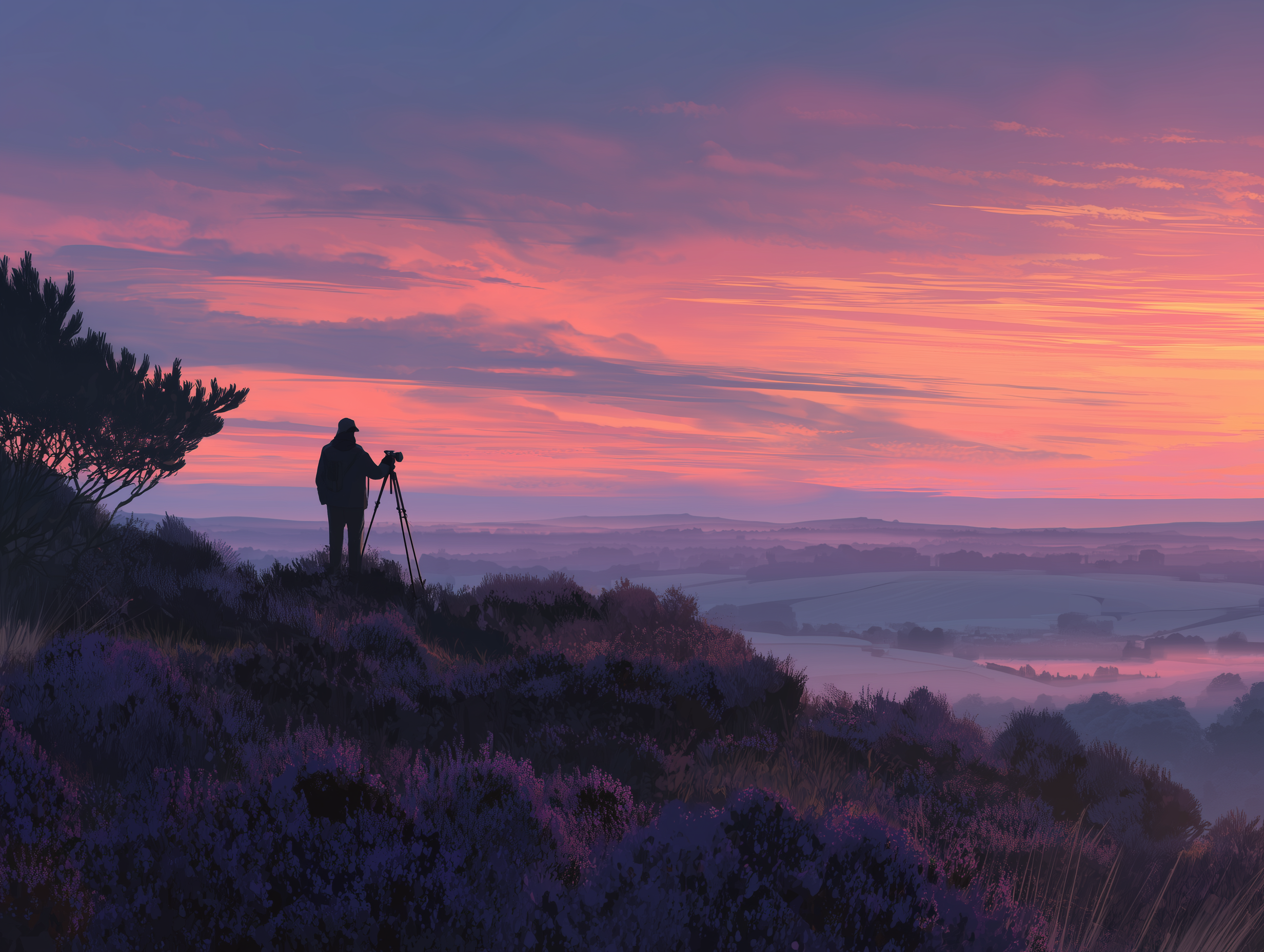The Ridgeway
Four days out and running low on water, but he didn't care. He stopped at the crest of the hill to catch his breath. It was full dark, but his eyes adjusted to the low light and gained a new sensitivity to the stars and constellations above. It didn't take long for the body to shake-off the city, just a few days to return to natural rhythms. Like it was trying to escape the whole time. The closing of dilated pupils, bathed always in the sterile glare of floodlights and searchlights. The relaxing of tight joints, freed from the cramped spaces of ration lines and security checkpoints. The constant wash of cortisol, carefully cultivated by a ceaseless stream of news headlines and political rhetoric, finally receding.
He could sense as much as see the trail before him, a path of glacial chalk that wormed its way through ninety miles of countryside, following the ridge of the escarpment. An hour to go, perhaps less. He knew he would make it before sunrise.
He picked a path down the the slope, slipping slightly on loose stones, the weight of his pack shifting about. He was halted by the crack of a rifle. A single report, loud and resonant, not like the constant chatter of low-calibre gunfire that reverberated through the city each night. He listened but heard nothing further.
He imagined a farmer, taking a deer or culling a fox. Sitting in a hide on the edge of a sparse field, watching a tall, skeletal outline emerge from the tree line and mists beyond. Sighting down the barrel, watching for a moment, seeing the slight contrast in curves and shadows that outlined the creature before him, imagining all that the darkness contained. Then pulling the trigger. The farmer's breath misting before him in the cold pre-dawn.
He was romanticising, but it was hard to avoid. Just a few hours outside of the city and all the stress and fear of the war dissolved. He felt guilty, to create this escape for himself but leave his family behind, if only for a few days. They had considered leaving the city, moving out into the countryside. Effort and inconvenience had stayed their hand, but the war was changing things, the fuel blockades and the street cordons and the curfews. Strange how some despot nation thousands of miles away could shape the daily rhythms of their lives so powerfully, but that was the nature of modern warfare. A mass of propaganda, the online world bleeding into the offline, poisonous rhetoric and deepfaked videos pouring in a tide between the myriad cracks already spread through society's thin skin.
A line of sheep cut the trail ahead, like a line of thick clouds blown straight across the horizon. They ambled determinedly onwards, indifferent to the stranger in their midst. He considered composing a photo, but the light was too low to shoot handheld.
He followed the trail as it wove through stands of gorse and errant pockets of juniper. From time to time he heard the sounds of the ridgeway's other inhabitants, the drumming of leporine paws met by a vulpine bark, nature's call-and-response.
The path disappeared into a final patch of woodland. The darkness became absolute and he reached for his head torch. Even turned to its lowest setting, the oaks and pines around him transformed into a hallucinogenic tangle of angular shadows. He passed a cottage, barely visible beneath a thick curtain of wisteria, the great gnarled vines tracing an ancient scaffolding upon the coarse stone exterior. The cottage slumbered in the shade, but he had seen it on many a summer's evening, with windows open and lace curtains dancing on the breeze blown in from the ridgeway. It was the height of impracticality, but in a flash of imagination he saw his family living beneath the old oak eaves. His daughter sitting on the tumbledown wall, his wife pruning the rosemary beside the front door.
It was decided then, in the way all long-debated concerns find their resolution in a flash of perfect clarity. They would move. The calculus of their city life had changed irreparably, but in degrees so slight as to go unnoticed. Looking from this new vantage point, the city seemed a place of needless suffering. They would move, not to this chocolate box cottage, but to some quiet hamlet on the downslope of the ancient ridgeway.
The daydream sustained him until his terminus. He climbed the final slope on aching legs, feeling the wind whip and claw at him as he grew more and more exposed on the great hill's southern face.
He crested the summit and the world unfolded before him.
He detached the tripod from his pack and set it upon the soft earth. Gentle pressure to each of the legs, a quick check of the spirit level. The barest hint of sunlight now, but enough, he knew.
The hill know as the Beacon lay before him, preceded by a series of low hills snaked with chalk-white tracks. A thousand years of footfall, carved through the scrub and grass. Marking the passage of drovers and traders, mystics and marauders, hiders and seekers.
He attached the camera and checked the composition through the viewfinder. Aperture, shutter speed, ISO, focal point, exposure compensation. He checked again.
Conditions were fair. Momentary respite. Not a breath of wind.
A final check. He triggered the shutter.
He bent to look at the display. The sky bathed the scene in a gentle wash of blue and pink. The grass pale and cool. A flock of sheep grazed the hillside. Perfect.
Almost. He scratched the screen with a thumbnail. A white speck blemished the horizon. He checked the live view. Nothing. The light was unchanged, so he took a second photograph. The speck was gone—or at least, it had moved, blown across the lens to the other side of the scene. He rummaged through his pack and cleaned the lens with his blower. He checked the light again and triggered the shutter.
Two blemishes now. Tiny white dots on the horizon.
He took the camera from the mount and turned his back to the wind. He removed the lens from the frame to inspect the sensor, sheltering the frame from airborne grit and detritus all the while. Spotless.
He remounted the camera and inspected the scene before him. Clear sky, too bright for stars. The light perfect, but changing quickly.
He stooped to look through the viewfinder and stopped, his breath caught in his chest.
He saw a white spot on the horizon, but bigger, far bigger than before. As he watched, more appeared beside it, blooming and fading, like raindrops rippling the surface of a pond. The camera fell to the ground as he staggered ahead, breaking into a run, scrabbling across the chalk plateau to the very edge of the hill. There he stopped, open-mouthed, watching the horizon blink and sparkle like lights on a Christmas tree.
In the growing light he saw the white chalk path stretching away into the distance, back towards the city at its far end. A city that flashed and sparked like something alive. A city illuminated by war.
He thought of the cottage garlanded with wisteria. His daughter sitting upon the old stone wall. Ninety miles lay between them. He started to run.

